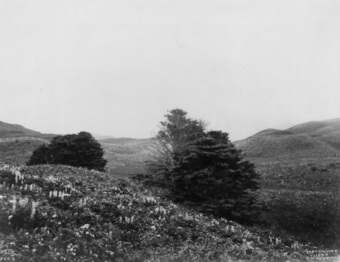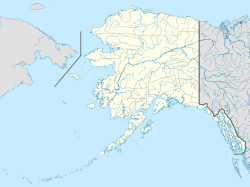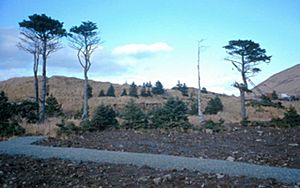Sitka Spruce Park facts for kids
|
Sitka Spruce Plantation
|
|

An 1899 photograph of the plantation
|
|
| Nearest city | Unalaska, Alaska |
|---|---|
| Area | less than 1 acre |
| Built | 1805 |
| NRHP reference No. | 78000513 |
Quick facts for kids Significant dates |
|
| Added to NRHP | February 14, 1978 |
| Designated NHL | June 02, 1978 |
Sitka Spruce Park is a public park located in Unalaska, Alaska. This park covers about 5 acres (2 hectares) and is found on Biorka Drive on Amaknak Island. It's special because it's one of the few places on the island with many trees.
A small part of the park is a National Historic Landmark. This means it's a very important historical site. It's known for having the earliest recorded attempt to plant a forest in North America. In 1805, people from Russia planted Sitka spruce trees here. By 1978, six of these original trees were still growing!
Contents
The History of Tree Planting
Amaknak Island naturally had no trees. It was too far north for trees to grow easily, unlike other parts of Alaska or Siberia.
First Planting Effort (1805)
The idea to plant trees came from Nikolai Rezanov in 1805. He was a leader in the Russian-American Company. This company had control over the fur trade in the area. Ten years after the first planting, only a few trees were still alive.
In 1834, Bishop Ivan Veniaminov reported that 24 trees were growing. Some of these trees were more than 7 feet (2 meters) tall. Veniaminov then started a second tree-planting project. This new site was on Expedition Island, about 1 mile (1.6 km) south of the first one.
Later Discoveries and Changes
A scientist named Bernhard Fernow visited Unalaska Island in 1899. He was the first professional botanist to study the site. At that time, there were 19 trees, with the tallest being over 30 feet (9 meters) tall.
Since then, people have continued to check on the trees. Before World War II, ten trees were still standing. However, four of them were likely destroyed during the war. The United States Army partly filled a nearby pond with gravel, which probably harmed the trees.
National Historic Landmark Status
By 1975, six of the trees from the original 1805 planting were still alive. Because of its unique history, the site was named a National Historic Landmark in 1978. It was also added to the National Register of Historic Places that same year.
 | Audre Lorde |
 | John Berry Meachum |
 | Ferdinand Lee Barnett |



